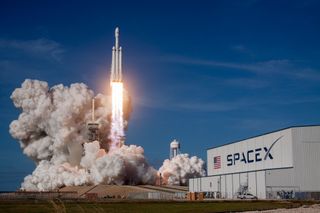SpaceX Fires Up Falcon Heavy Ahead of Rocket's 2nd-Ever Launch Next Week
Today's static fire test paves the way for a planned April 9 launch for the huge rocket.

CAPE CANAVERAL, Fla. — The second flight of the most powerful rocket in operation is just days away. SpaceX is targeting Tuesday (April 9) for the next flight of its megarocket, the Falcon Heavy. Essentially three Falcon 9 boosters strapped together, the behemoth will lift off from historic Pad 39A here at NASA's Kennedy Space Center.
This afternoon (April 5), a shiny new Falcon Heavy roared to life, as smoke billowed from its engines during a preflight test. The brief ignition, known as a static fire test, is one of the last major milestones in launch preparations, ensuring that all systems are working properly and that the rocket is ready to fly.
The highly anticipated test — originally estimated to take place on April 1 — appeared to go off without a hitch. Not long after the rocket's engines shut down, SpaceX tweeted that the launch would happen as early as Tuesday. So, Falcon Heavy seems set to fly for the first time since its maiden voyage in February 2018.
Related: In Photos: SpaceX's 1st Falcon Heavy Rocket Test Launch Success!
Static fire data looks good so far. This is first launch of Falcon Heavy Block 5, so we’re being extra cautious. Launch date might move. https://t.co/qTqXtQQe2kApril 5, 2019
The upcoming mission, dubbed Arabsat 6A, will launch a large communications satellite for Saudi Arabian corporation Arabsat. Built by Lockheed Martin, the satellite is an advanced commercial communications satellite, designed to provide internet and communications services to residents of the Middle East, Africa and parts of Europe. (Arabsat 6A was originally slated to launch in the third quarter of 2018, but the liftoff has slipped several months.)
Falcon Heavy is the most powerful rocket flying today, but it has only one spaceflight under its belt so far. The reusable rocket first launched on Feb. 6, 2018, ferrying Elon Musk's cherry-red Tesla Roadster — "driven" by a spacesuit-wearing dummy named Starman — into orbit. The nearly flawless first launch, which included successful landings by two of the Falcon Heavy's three first-stage boosters, earned SpaceX major accolades, including coveted military launch contracts.
Fetching a price between $90 million and $150 million per launch, Falcon Heavy has already been certified by the U.S. Air Force to fly national security payloads. SpaceX has even snagged a military mission for the rocket — a $130 million deal to launch an Air Force Space Command satellite.
Get the Space.com Newsletter
Breaking space news, the latest updates on rocket launches, skywatching events and more!
The black-and-white colossus combines three Falcon 9 first stages to form one 27-engine megarocket. Last May, just months after Falcon Heavy’s debut, SpaceX made a long-awaited transition to a more capable version of the Falcon 9. The souped-up Falcon 9, dubbed the Block 5, packs a much bigger punch: 1.8 million lbs. of thrust. According to Musk, that means that the Falcon Heavy that flies next week could feature more than 5 million lbs. of thrust — roughly a 10% increase over last year's demonstration flight.
Onlookers got a taste of that increased performance today as the rocket’s 27 first-stage engines fired in unison for a few seconds. In addition to the added thrust, the Block 5 Falcon 9 features myriad upgrades designed to facilitate reusability. Previous versions of the Falcon 9 were designed to only fly two to three times; the Block 5 is capable of flying as many as 10 times with little to no refurbishment in between flights, Musk has said.
Falcon Heavy is expected to launch at 6:36 p.m. EDT (2236 GMT) on Tuesday. If all goes according to plan, the two side boosters will touch down in unison on their designated landing pad at Cape Canaveral Air Force Station, while the central booster will land at sea, on one of the company’s two drone ships.
- SpaceX's Huge Falcon Heavy Rocket: How It Works (Infographic)
- See the Evolution of SpaceX's Rockets in Pictures
- SpaceX Wins $130 Million Military Launch Contract for Falcon Heavy Rocket
Follow us on Twitter @Spacedotcom or Facebook.
Join our Space Forums to keep talking space on the latest missions, night sky and more! And if you have a news tip, correction or comment, let us know at: community@space.com.

Amy Thompson is a Florida-based space and science journalist, who joined Space.com as a contributing writer in 2015. She's passionate about all things space and is a huge science and science-fiction geek. Star Wars is her favorite fandom, with that sassy little droid, R2D2 being her favorite. She studied science at the University of Florida, earning a degree in microbiology. Her work has also been published in Newsweek, VICE, Smithsonian, and many more. Now she chases rockets, writing about launches, commercial space, space station science, and everything in between.
